U2 | ||
| Allmusic Biography : Through a combination of zealous righteousness and post-punk experimentalism, U2 became one of the most popular rock & roll bands in the world -- equally known for their sweeping sound as for their grandiose statements about politics and religion. The Edge provided the group with a signature sound by creating sweeping sonic landscapes with his heavily processed, echoed guitars. Though the Edges style wasnt conventional, the rhythm section of Larry Mullen, Jr. and Adam Clayton played the songs as driving hard rock, giving the band a forceful, powerful edge that was designed for arenas. And their lead singer, Bono, was a frontman with a knack of grand gestures that played better in stadiums than small clubs. Its no accident that footage of Bono parading with a white flag with "Sunday Bloody Sunday" blaring in the background became the defining moment of U2s early career -- there rarely was a band that believed so deeply in rocks potential for revolution as U2, and there rarely was a band whose members didnt care if they appeared foolish in the process. During the course of the early 80s, the group quickly built up a dedicated following through constant touring and a string of acclaimed records. By 1987, U2s following had grown large enough to propel them to the level of international superstardom with the release of The Joshua Tree. Unlike many of their contemporaries, they were able to sustain such popularity in the 90s by reinventing themselves as a postmodern, self-consciously ironic, dance-inflected pop/rock act, owing equally to the experimentalism of late-70s Bowie and 90s electronic dance and techno. By performing such a successful reinvention, the band confirmed its status as one of the most popular groups in rock history, in addition to earning additional critical respect. With its textured guitars, the bands sound was undeniably indebted to post-punk, so its slightly ironic that U2 formed in 1976, before punk had even reached their hometown of Dublin, Ireland. Larry Mullen, Jr. (born October 31, 1961; drums), posted a notice on a high school bulletin board asking for fellow musicians to form a band. Bono (born Paul Hewson, May 10, 1960; vocals), the Edge (born David Evans, August 8, 1961; guitar, keyboards, vocals), Adam Clayton (born March 13, 1960; bass), and Dick Evans responded to the ad, and the teenagers came together as a Beatles and Stones cover band called the Feedback. They then changed their name to the Hype in 1977. Shortly afterward, Dick Evans left the band to form the Virgin Prunes, and the group changed names once again, this time adopting the moniker of U2. U2s first big break arrived in 1978, during the members final year of high school, when they won a talent contest sponsored by Guinness. By the end of the year, the Stranglers manager, Paul McGuinness, had seen U2 play and offered to manage them. Even with a powerful manager in their corner, the band had trouble making much headway, and failed an audition with CBS Records at the end of the year. In the fall of 1979, U2 released their debut EP, U2 Three. The EP was available only in Ireland, where it topped the national charts. Shortly afterward, they began to play in England, but they failed to gain much attention away from home. U2 scored one more chart-topping single, "Another Day," in early 1980 before Island Records offered the group a contract. Later that year, the bands full-length debut, Boy, was released. Produced by Steve Lillywhite, the albums sweeping, atmospheric but edgy sound was unlike most recordings by U2s post-punk contemporaries, and the band earned further attention for its public embrace of Christianity; only Clayton was not a practicing Christian. Through constant touring, including opening gigs for Talking Heads, U2 were able to take Boy into the American Top 70 in early 1981. October, also produced by Lillywhite, followed in the fall, and it became their British breakthrough, reaching number 11 on the charts. By early 1983, Boys "I Will Follow" and Octobers "Gloria" had become staples on MTV, which, along with their touring, gave U2 a formidable cult following in the U.S. Released in the spring of 1983, the Lillywhite-produced War became U2s breakthrough release, entering the U.K. charts at number one and elevating them into arenas in the United States, where the album peaked at number 12. War had a stronger political message than its predecessors, as evidenced by the international hits "Sunday Bloody Sunday" and "New Years Day." During the supporting tour, the band filmed its concert at Colorados Red Rocks Amphitheater, releasing the show as an EP and video titled Under a Blood Red Sky. The EP entered in the U.K. charts at number two, becoming the most successful live recording in British history. U2 had become one of the most popular bands in the world, and their righteous political stance soon became replicated by many other bands, providing the impetus for the Band Aid and Live Aid projects in 1984 and 1985, respectively. For the follow-up to War, U2 entered the studios with co-producers Brian Eno and Daniel Lanois, who helped give the resulting album an experimental, atmospheric tone. Released in the fall of 1984, The Unforgettable Fire replicated the chart status of War, entering the U.K. charts at number one and reaching number 12 in the U.S. The album also generated the groups first Top 40 hit in America with "(Pride) In the Name of Love," a tribute to Martin Luther King, Jr. U2 supported the album with a successful international tour, highlighted by a show-stealing performance at Live Aid. Following the tour, the band released the live EP Wide Awake in America in 1985. While U2 had become one of the most successful rock bands of the 80s, they didnt truly become superstars until the spring 1987 release of The Joshua Tree. Greeted with enthusiastic reviews, many of which proclaimed the album a masterpiece, The Joshua Tree became U2s first American number one hit and their third straight album to enter the U.K. charts at number one; in England, it set a record by going platinum within 28 hours. Generating the U.S. number one hits "With or Without You" and "I Still Havent Found What Im Looking For," The Joshua Tree and the groups supporting tour became the biggest success story of 1987, earning U2 the cover of respected publications like Time magazine. U2 decided to film a documentary about their American tour, recording new material along the way. The project became Rattle & Hum, a film that was supported by a double-album soundtrack that was divided between live tracks and new material. While the album Rattle & Hum was a hit, the record and film received the weakest reviews of U2s career, with many critics taking issue with the groups fascination with American roots music like blues, soul, country, and folk. Following the release of Rattle & Hum, the band took an extended hiatus. U2 reconvened in Berlin in 1990 to record a new album with Eno and Lanois. While the sessions for the album were difficult, the resulting record, Achtung Baby, represented a successful reinvention of the bands trademark sound. Where they had been inspired by post-punk in the early career and American music during their mid-career, U2 delved into electronic and dance music with Achtung Baby. Inspired equally by late-70s Bowie and the Madchester scene in the U.K., Achtung Baby was sonically more eclectic and adventurous than U2s earlier work, and it didnt alienate their core audience. The album debuted at number one throughout the world and spawned Top Ten hits with "Mysterious Ways" and "One." Early in 1992, the group launched an elaborate tour to support Achtung Baby. Dubbed Zoo TV, the tour was an innovative blend of multimedia electronics, featuring a stage filled with televisions, suspended cars, and cellular phones. Bono devised an alter ego called the Fly, which was a knowing send-up of rock stardom. Even under the ironic guise of the Fly and Zoo TV, it was evident that U2 were looser and more fun than ever before, even though they had not abandoned their trademark righteous political anger. Following the completion of the American Zoo TV tour in late 1992 and preceding the launch of the tours European leg, U2 entered the studio to complete an EP of new material that soon became the full-length Zooropa. Released in the summer of 1993 to coincide with the tour of the same name, Zooropa demonstrated a heavier techno and dance influence than Achtung Baby and received strong reviews. Nevertheless, the album stalled at sales of two million and failed to generate a big hit single. During the subsequent Zooropa tour, the Fly metamorphosed into the demonic MacPhisto, which dominated the remainder of the tour. Upon the completion of the Zooropa tour in late 1993, the band took another extended break. During 1995, U2 re-emerged with "Hold Me, Thrill Me, Kiss Me, Kill Me," a glam rock theme to Batman Forever that was produced by Nellee Hooper (Björk, Soul II Soul). Later that year, they recorded the collaborative album Original Soundtracks, Vol. 1 with Brian Eno, releasing the record under the name the Passengers late in 1995. It was greeted with a muted reception, both critically and commercially. Many hardcore U2 fans (including drummer Larry Mullen Jr.) were unhappy with the Passengers project, and U2 promised their next album, to be released in the fall of 1996, would be a rock & roll record. The album took longer to complete than usual, ultimately being pushed back to the spring of 1997. During its delay, a few tracks, including the forthcoming first single "Discotheque," were leaked, and it became clear that the new album was going to be heavily influenced by techno, dance, and electronic music. When it was finally released, Pop did indeed bear a heavier dance influence, but it was greeted with strong initial sales and a few positive reviews. Demand for the album lessened in the following months, however, and Pop ultimately became the bands least popular album in over a decade. In late 1998, the group returned with Best of 1980-1990, the first in a series of hits collections issued in conjunction with a reported 50 million dollar agreement with Polygram. Included in the comprehensive track list was a remixed version of "Sweetest Thing," originally released as B-side in 1987, which charted well in multiple countries. Three years after the mediocre response to Pop, U2 teamed up with Eno and Lanois once again to release All That You Cant Leave Behind in fall 2000. The album was heralded as a return to form, melding the bands classic sound with contemporary trends. It topped charts around the world, reached number three in America, earned Grammy Awards for the singles "Beautiful Day" and "Walk On," and became the bands biggest-selling record in years. (The Elevation tour that followed also brought U2 a hefty paycheck.) Steve Lillywhite, producer of the early-80s landmarks Boy, October, and War, returned to the helm for U2s next record, How to Dismantle an Atomic Bomb. Released in November 2004, it hit the top of the Billboard charts and quickly gained platinum status. The album also garnered eight Grammy Awards, including Album of the Year, Rock Album of the Year, and Song of the Year (for "Sometimes You Cant Make It on Your Own," which Bono had written for his father). U2 were inducted into the Rock & Roll Hall of Fame in early 2005 and launched an international tour soon after, selling out arena venues in the U.S. and outdoor stadium shows abroad. The Vertigo Tour became the highest-grossing tour of 2005; by the time the entire tour concluded in late 2006, its gross of $389 million had made it the second most successful tour ever. U2 returned to the drawing board in 2006 by partnering with veteran rock producer Rick Rubin. Two songs from those sessions appeared on the compilation U218 Singles, but the remaining material was ultimately scrapped. The band then turned to longtime friends Brian Eno, Daniel Lanois, and Steve Lillywhite, all of whom helped shape the sound of U2s 12th studio effort. Entitled No Line on the Horizon, the album was originally slated to appear in October 2008, although the release date was ultimately pushed back to March 2009. No Line on the Horizon was met with enthusiastic reviews but failed to yield a big radio single; even so, the band embarked on another lucrative tour that summer. A second leg, originally planned for 2010, was postponed when Bono suffered a slipped disc and underwent emergency back surgery. Touring resumed the following year, and the so-called 360 Tour was ultimately named the highest-grossing concert tour in history. Meanwhile, Bono and the Edge also worked on music for the Broadway musical Spider-Man: Turn Off the Dark, which opened in June 2011. Not long after completing the 360 Tour, U2 turned their attention to recording their 13th album, a process that turned out to be rather complicated. Initially, the group worked with such dance-oriented producers as will.i.am and David Guetta, but as the sessions progressed, the concept of the record changed, as did the producers, with the band trying out Ryan Tedder and Flood before eventually settling in for the long haul with Danger Mouse. The first fruits of these sessions appeared in late 2013, when "Ordinary Love" was released as part of the soundtrack to the film Mandela: Long Walk to Freedom; the song was nominated for an Oscar and won a Golden Globe. The next song up was "Invisible," which appeared to be the opening salvo for a new album as it soundtracked a commercial for Super Bowl XLVIII and the group played it on the inaugural February 17, 2014 episode of The Tonight Show Starring Jimmy Fallon. Commercial response to the single was lukewarm and the band retreated into the studio for several more months, unexpectedly emerging with a completed album called Songs of Innocence on September 9, 2014. Available in its first month-and-a-half as a free download, Songs of Innocence saw a physical release in October. Upon that release, it debuted at nine on the Billboard 200, selling 25,000 copies in its first week. U2 toured the album through 2015 and began work on their next album, Songs of Experience, in 2016. They set the album aside in 2017 to celebrate the 30th anniversary of The Joshua Tree by touring that album and releasing a deluxe reissue of the 1987 LP. By late August 2017, the first music from Songs of Experience surfaced via a video of "The Blackout," which was followed in early September by "Youre the Best Thing About Me," the first official single from the album. | ||
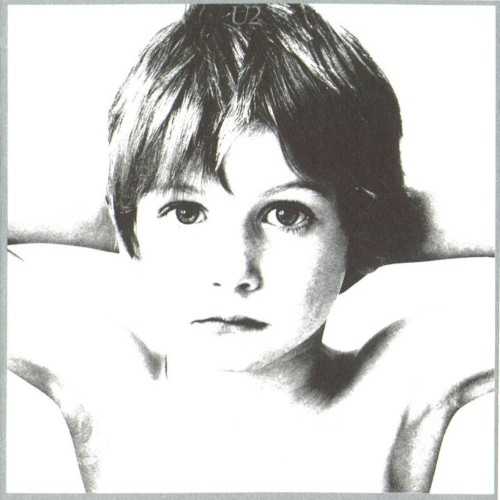 | Album: 1 of 22 Title: Boy Released: 1980-10-20 Tracks: 10 Duration: 42:18 Scroll: Up Down Top Bottom 25% 50% 75% Spotify Allmusic AlbumCover | 1 I Will Follow (03:37) 2 Twilight (04:22) 3 An Cat Dubh / Into the Heart (08:17) 4 Out of Control (04:14) 5 Stories for Boys (03:02) 6 The Ocean (01:35) 7 A Day Without Me (03:13) 8 Another Time, Another Place (04:33) 9 The Electric Co. (04:47) 10 Shadows and Tall Trees (04:36) |
| Boy : Allmusic album Review : From the outset, U2 went for the big message -- every song on their debut album Boy sounds huge, with oceans of processed guitars cascading around Bonos impassioned wail. It was an inspired combination of large, stadium-rock beats and post-punk textures. Without the Edges echoed, ringing guitar, U2 would have sounded like a traditional hard rock band, since the rhythm section and Bono treat each song as an anthem. Of course, thats the charm of Boy: all of its emotions are on the surface, delivered with optimistic, youthful self-belief, yet the unusual, distinctive guitar textures give it an unexpected tension that makes it an exhilarating debut. The songs may occasionally show some weakness -- the driving "I Will Follow," the dark "An Cat Dubh," and the shimmering "The Ocean" stand out among the sonic textures -- yet the bands musical and lyrical vision keep Boy compelling until the finish. | ||
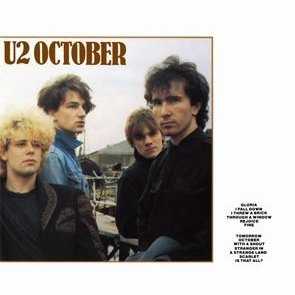 | Album: 2 of 22 Title: October Released: 1981-10-12 Tracks: 11 Duration: 41:07 Scroll: Up Down Top Bottom 25% 50% 75% Spotify Wikipedia Allmusic AlbumCover | 1 Gloria (04:12) 2 I Fall Down (03:39) 3 I Threw a Brick Through a Window (04:54) 4 Rejoice (03:38) 5 Fire (03:50) 6 Tomorrow (04:39) 7 October (02:20) 8 With a Shout (04:02) 9 Stranger in a Strange Land (03:57) 10 Scarlet (02:52) 11 Is That All? (02:59) |
| October : Allmusic album Review : U2 sounded so confident and assured on their debut that perhaps it was inevitable they would stumble slightly on its follow-up, October. The record isnt weaker than its predecessor because it repeats the formula of Boy. Its because the band tries too hard to move forward. Bono, in particular, tries too hard to make big political, emotional, and religious statements, but the remainder of the band isnt innocent. In general, the music is too pompous, with the sound overwhelming the actual songs. But when U2 do marry the message, melody, and sound together, as on "Gloria," "I Threw a Brick Through a Window," and "I Fall Down," the results are thoroughly impressive. | ||
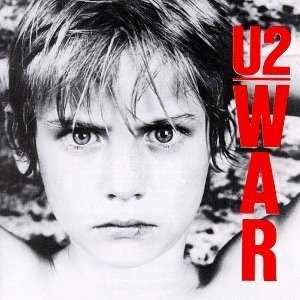 | Album: 3 of 22 Title: War Released: 1983-02-28 Tracks: 10 Duration: 42:08 Scroll: Up Down Top Bottom 25% 50% 75% Spotify TrackSamples Wikipedia Allmusic AlbumCover | 1 Sunday Bloody Sunday (04:40) 2 Seconds (03:10) 3 New Year’s Day (05:35) 4 Like a Song… (04:46) 5 Drowning Man (04:14) 6 The Refugee (03:40) 7 Two Hearts Beat as One (04:03) 8 Red Light (03:46) 9 Surrender (05:34) 10 “40” (02:35) |
| War : Allmusic album Review : Opening with the ominous, fiery protest of "Sunday Bloody Sunday," War immediately announces itself as U2s most focused and hardest-rocking album to date. Blowing away the fuzzy, sonic indulgences of October with propulsive, martial rhythms and shards of guitar, War bristles with anger, despair, and above all, passion. Previously, Bonos attempts at messages came across as grandstanding, but his vision becomes remarkably clear on this record, as his anthems ("New Years Day," "40," "Seconds") are balanced by effective, surprisingly emotional love songs ("Two Hearts Beat as One"), which are just as desperate and pleading as his protests. He performs the difficult task of making the universal sound personal, and the band helps him out by bringing the songs crashing home with muscular, forceful performances that reveal their varied, expressive textures upon repeated listens. U2 always aimed at greatness, but War was the first time they achieved it. | ||
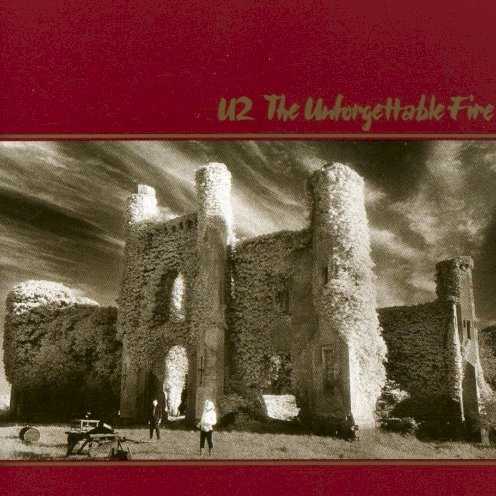 | Album: 4 of 22 Title: The Unforgettable Fire Released: 1984-10-01 Tracks: 10 Duration: 42:45 Scroll: Up Down Top Bottom 25% 50% 75% Spotify TrackSamples Wikipedia Allmusic AlbumCover | 1 A Sort of Homecoming (05:28) 2 Pride (In the Name of Love) (03:49) 3 Wire (04:19) 4 The Unforgettable Fire (04:55) 5 Promenade (02:34) 6 4th of July (02:14) 7 Bad (06:08) 8 Indian Summer Sky (04:19) 9 Elvis Presley and America (06:22) 10 MLK (02:34) |
| The Unforgettable Fire : Allmusic album Review : In many ways, U2 took their fondness for sonic bombast as far as it could go on War, so it isnt a complete surprise that they chose to explore the intricacies of the Edges layered, effects-laden guitar on the follow-up, The Unforgettable Fire. Working with producers Brian Eno and Daniel Lanois, U2 created a dark, near-hallucinatory series of interlocking soundscapes that are occasionally punctuated by recognizable songs and melodies. In such a setting, the band both flourishes and flounders, creating some of their greatest music, as well as some of their worst. "Elvis Presley and America" may well be Bonos most embarrassing attempt at poetry, yet it is redeemed by the chilling and wonderful "Bad," a two-chord elegy for an addict that is stunning in its control and mastery. Similarly, the wet, shimmering textures of the title track, the charging "A Sort of Homecoming," and the surging Martin Luther King, Jr. tribute "Pride (In the Name of Love)" are all remarkable, ranking among U2s very best music, making the missteps that clutter the remainder of the album somewhat forgivable. | ||
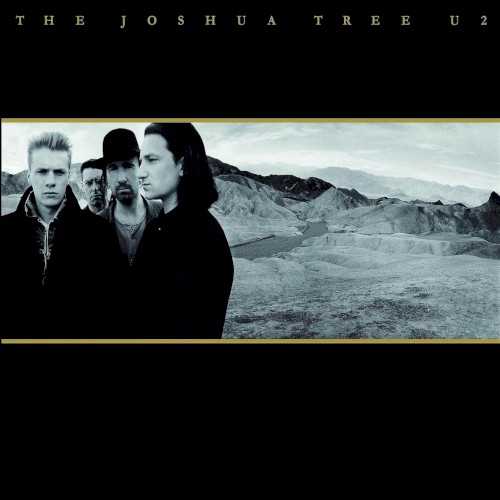 | Album: 5 of 22 Title: The Joshua Tree Released: 1987-03-09 Tracks: 11 Duration: 50:12 Scroll: Up Down Top Bottom 25% 50% 75% Spotify Wikipedia Allmusic AlbumCover | 1 Where the Streets Have No Name (05:37) 2 I Still Haven’t Found What I’m Looking For (04:38) 3 With or Without You (04:56) 4 Bullet the Blue Sky (04:32) 5 Running to Stand Still (04:17) 6 Red Hill Mining Town (04:53) 7 In God’s Country (02:57) 8 Trip Through Your Wires (03:32) 9 One Tree Hill (05:23) 10 Exit (04:13) 11 Mothers of the Disappeared (05:12) |
| The Joshua Tree : Allmusic album Review : Using the textured sonics of The Unforgettable Fire as a basis, U2 expanded those innovations by scaling back the songs to a personal setting and adding a grittier attack for its follow-up, The Joshua Tree. Its a move that returns them to the sweeping, anthemic rock of War, but if War was an exploding political bomb, The Joshua Tree is a journey through its aftermath, trying to find sense and hope in the desperation. That means that even the anthems -- the epic opener "Where the Streets Have No Name," the yearning "I Still Havent Found What Im Looking For" -- have seeds of doubt within their soaring choruses, and those fears take root throughout the album, whether its in the mournful sliding acoustic guitars of "Running to Stand Still," the surging "One Tree Hill," or the hypnotic elegy "Mothers of the Disappeared." So it might seem a little ironic that U2 became superstars on the back of such a dark record, but their focus has never been clearer, nor has their music been catchier, than on The Joshua Tree. Unexpectedly, U2 have also tempered their textural post-punk with American influences. Not only are Bonos lyrics obsessed with America, but country and blues influences are heard throughout the record, and instead of using these as roots, theyre used as ways to add texture to the music. With the uniformly excellent songs -- only the clumsy, heavy rock and portentous lyrics of "Bullet the Blue Sky" fall flat -- the result is a powerful, uncompromising record that became a hit due to its vision and its melody. Never before have U2s big messages sounded so direct and personal. | ||
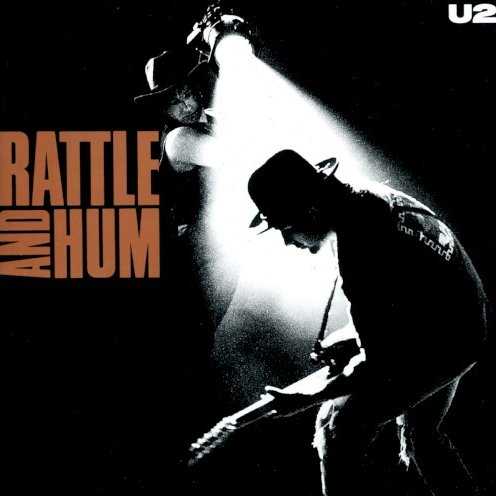 | Album: 6 of 22 Title: Rattle and Hum Released: 1988-07-14 Tracks: 17 Duration: 1:12:26 Scroll: Up Down Top Bottom 25% 50% 75% Spotify Wikipedia Allmusic AlbumCover | 1 Helter Skelter (03:08) 2 Van Diemen’s Land (03:05) 3 Desire (02:59) 4 Hawkmoon 269 (06:23) 5 All Along the Watchtower (04:24) 6 I Still Haven’t Found What I’m Looking For (05:55) 7 Freedom for My People (00:36) 8 Silver and Gold (05:50) 9 Pride (In the Name of Love) (04:27) 10 Angel of Harlem (03:49) 11 Love Rescue Me (06:25) 12 When Love Comes to Town (04:16) 13 Heartland (05:03) 14 God Part II (03:16) 15 The Star Spangled Banner (00:43) 16 Bullet the Blue Sky (05:37) 17 All I Want Is You (06:30) |
| Rattle and Hum : Allmusic album Review : Functioning as both the soundtrack to the groups disastrous feature-film documentary and as a tentative follow-up to their career-making blockbuster, Rattle and Hum is all over the place. The live cuts lack the revelatory power of Under a Blood Red Sky and are undercut by heavy-handed performances and Bonos embarrassing stage patter; prefacing a leaden cover of "Helter Skelter" with "This is a song Charles Manson stole from the Beatles, and now were stealing it back" is bad enough, but it pales next to Bonos exhortation "OK, Edge, play the blues!" on the worthy, decidedly unbluesy "Silver and Gold." Both comments reveal more than they intend -- throughout the album, U2 sound paralyzed by their new status as "rocks most important band." They react by attempting to boost their classic rock credibility. They embrace American roots rock, something they ignored before. Occasionally, these experiments work: "Desire" has an intoxicating Bo Diddley beat, "Angel of Harlem" is a punchy, sunny Stax-soul tribute, "When Loves Come to Town" is an endearingly awkward blues duet with B.B. King, and the Dylan collaboration "Love Rescue Me" is an overlooked minor bluesy gem. However, these get swallowed up in the bluster of the live tracks, the misguided gospel interpretation of "I Still Havent Found What Im Looking For" and the shameful answer to John Lennons searing confession "God," "God, Pt. 2." A couple of affecting laments -- the cascading "All I Want Is You" and "Heartland," which sounds like a Joshua Tree outtake -- do slip out underneath the posturing, but Rattle and Hum is by far the least-focused record U2 ever made, and its little wonder that they retreated for three years after its release to rethink their whole approach. | ||
 | Album: 7 of 22 Title: Achtung Baby Released: 1991-11-18 Tracks: 12 Duration: 55:27 Scroll: Up Down Top Bottom 25% 50% 75% Spotify Wikipedia Allmusic AlbumCover | 1 Zoo Station (04:36) 2 Even Better Than the Real Thing (03:41) 3 One (04:36) 4 Until the End of the World (04:38) 5 Who’s Gonna Ride Your Wild Horses (05:16) 6 So Cruel (05:49) 7 The Fly (04:29) 8 Mysterious Ways (04:03) 9 Tryin’ to Throw Your Arms Around the World (03:52) 10 Ultra Violet (Light My Way) (05:30) 11 Acrobat (04:30) 12 Love Is Blindness (04:23) |
| Achtung Baby : Allmusic album Review : Reinventions rarely come as thorough and effective as Achtung Baby, an album that completely changed U2s sound and style. The crashing, unrecognizable distorted guitars that open "Zoo Station" are a clear signal that U2 have traded their Americana pretensions for postmodern, contemporary European music. Drawing equally from Bowies electronic, avant-garde explorations of the late 70s and the neo-psychedelic sounds of the thriving rave and Madchester club scenes of early-90s England, Achtung Baby sounds vibrant and endlessly inventive. Unlike their inspirations, U2 rarely experiment with song structures over the course of the album. Instead, they use the thick dance beats, swirling guitars, layers of effects, and found sounds to break traditional songs out of their constraints, revealing the tortured emotional core of their songs with the hyper-loaded arrangements. In such a dense musical setting, it isnt surprising that U2 have abandoned the political for the personal on Achtung Baby, since the music, even with its inviting rhythms, is more introspective than anthemic. Bono has never been as emotionally naked as he is on Achtung Baby, creating a feverish nightmare of broken hearts and desperate loneliness; unlike other U2 albums, its filled with sexual imagery, much of it quite disturbing, and it ends on a disquieting note. Few bands as far into their career as U2 have recorded an album as adventurous or fulfilled their ambitions quite as successfully as they do on Achtung Baby, and the result is arguably their best album. | ||
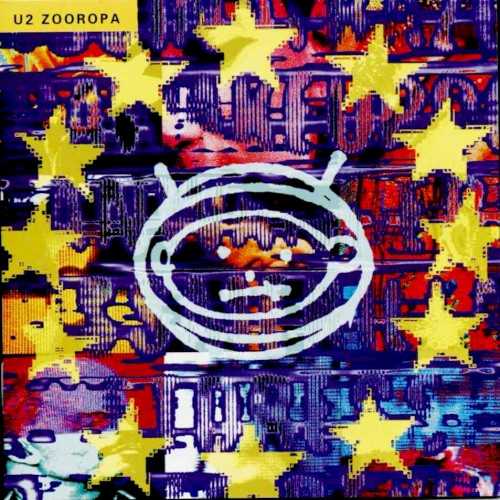 | Album: 8 of 22 Title: Zooropa Released: 1993-07-05 Tracks: 10 Duration: 50:21 Scroll: Up Down Top Bottom 25% 50% 75% Spotify Wikipedia Allmusic AlbumCover | 1 Zooropa (06:31) 2 Babyface (04:01) 3 Numb (04:20) 4 Lemon (06:58) 5 Stay (Faraway, So Close!) (04:59) 6 Daddy’s Gonna Pay for Your Crashed Car (05:20) 7 Some Days Are Better Than Others (04:17) 8 The First Time (03:44) 9 Dirty Day (05:24) 10 The Wanderer (04:44) |
| Zooropa : Allmusic album Review : U2 planned to record a new EP before launching the European leg of their ambitious Zoo TV tour in 1993, but the EP quickly turned into the full-length album Zooropa. Picking up where Achtung Baby left off, Zooropa delves heavily into U2s newfound affection for experimental music and dance clubs. While the title track marries those inclinations to the anthems of The Joshua Tree, most of the record is far more daring than its predecessor. While that occasionally means its unfocused and meandering, it also results in a number of wonderful moments, like the quiet menace of "Daddys Gonna Pay for Your Crashed Car," and the space-age German disco of "Lemon," the Edges droning mantra "Numb," and the gentle, heartbroken "Stay (Faraway, So Close!)," one of U2s very best love songs. As the album winds to a close, it drifts off track, yet the best moments of Zooropa rank among U2s most inspired and rewarding music. | ||
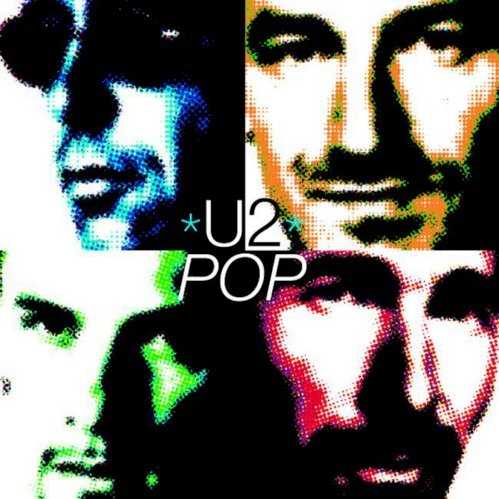 | Album: 9 of 22 Title: Pop Released: 1997-02-26 Tracks: 12 Duration: 1:00:11 Scroll: Up Down Top Bottom 25% 50% 75% Spotify Wikipedia Allmusic AlbumCover | 1 Discothèque (05:19) 2 Do You Feel Loved (05:07) 3 Mofo (05:49) 4 If God Will Send His Angels (05:22) 5 Staring at the Sun (04:37) 6 Last Night on Earth (04:45) 7 Gone (04:26) 8 Miami (04:52) 9 The Playboy Mansion (04:40) 10 If You Wear That Velvet Dress (05:15) 11 Please (05:02) 12 Wake Up Dead Man (04:52) |
| Pop : Allmusic album Review : No matter which way you look at it, Pop doesnt have the same shock of the new that Achtung Baby delivered on first listen. Less experimental and more song-oriented than Zooropa, Pop attempts to sell the glitzy rush of techno to an audience weaned on arena rock. And that audience includes U2 themselves. While they never sound like they dont believe in what theyre doing, they still remove most of the radical elements of electronic dance, which is evident to anyone with just a passing knowledge of the Chemical Brothers and Underworld. To a new listener, Pop has flashes of surprise -- particularly on the rampaging "Mofo" -- but underneath the surface, U2 rely on anthemic rockers and ballads. "Discotheque" might be a little clumsy, but "Staring at the Sun" shimmers with synthesizers borrowed from Massive Attack and a Noel Gallagher chorus. Similarly, "Do You Feel Loved" and "If You Wear That Velvet Dress" fuse old-fashioned U2 dynamism with a keen sense of the cool eroticism that makes trip-hop so alluring. Problems arise when the group tries to go for conventional rock songs, some of which are symptomatic of the return of U2s crusade for salvation. Pop is inflected with the desire for a higher power to save the world from its jaded spiral of decay and immorality, which is why the groups embrace of dance music never seems joyous -- instead of providing an intoxicating rush of gloss and glamour, it functions as a backdrop for a plea of salvation. Achtung Baby also was a comment on the numbing isolation of modern culture, but it made sweeping statements through personal observations; Pop makes sweeping statements through sweeping observations. The difference is what makes Pop an easy record to admire, but a hard one to love. | ||
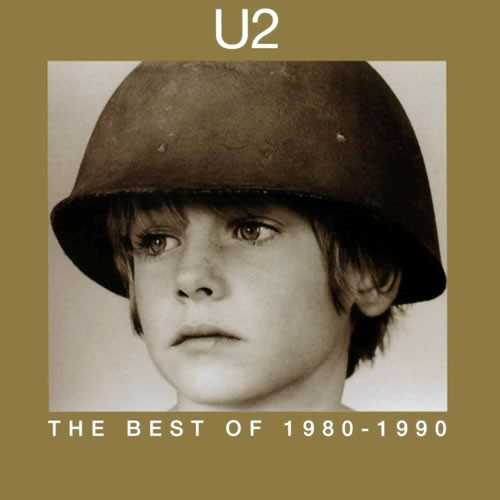 | Album: 10 of 22 Title: The Best of 1980–1990 Released: 1998-10-28 Tracks: 14 Duration: 1:05:22 Scroll: Up Down Top Bottom 25% 50% 75% Spotify Wikipedia Allmusic AlbumCover | 1 Pride (In the Name of Love) (03:49) 2 New Year’s Day (04:18) 3 With or Without You (04:56) 4 I Still Haven’t Found What I’m Looking For (04:38) 5 Sunday Bloody Sunday (04:40) 6 Bad (05:51) 7 Where the Streets Have No Name (04:36) 8 I Will Follow (03:37) 9 The Unforgettable Fire (04:55) 10 Sweetest Thing (the single mix) (03:02) 11 Desire (02:59) 12 When Love Comes to Town (04:16) 13 Angel of Harlem (03:49) 14 All I Want Is You / October (09:51) |
| The Best of 1980–1990 : Allmusic album Review : As one of the most popular bands of the 80s, U2 didnt quite fit into any particular category. They were a post-punk band that quickly found acceptance from a hard rock audience, a group that made fully formed albums but often made their best statements on individual songs, especially during the 80s. Consequently, theyre a very hard band to anthologize. Since they were most effective on single songs, it seems that throwing all of them together on one disc would work. The problem is, each of the albums, from Boy to Rattle and Hum, has a distinctive flavor that doesnt necessarily blend when combined, especially in the nonchronological form of The Best of 1980-1990. Theres little quibbling with the featured tracks on U2s first compilation -- a few important songs, such as "Gloria," "I Fall Down," "Seconds," and "Two Hearts Beat as One," may be missing, but everything else deserves to be here ("Pride," "New Years Day," "With or Without You," "I Still Havent Found What Im Looking For," "Sunday Bloody Sunday," "Bad," "Desire," etc.). Even though the song selection is strong, the album winds up as less than the sum of its parts -- each song is pretty great of its own accord (even the single mix of the B-side "Sweetest Thing," which is, in truth, not much different at all), but the overall effect is a little underwhelming. On one hand, it may be a good choice for casual fans or nostalgia mongers, since it does contain everything they need to hear, but anyone who has more than a passing interest in the band will be better suited with individual albums. | ||
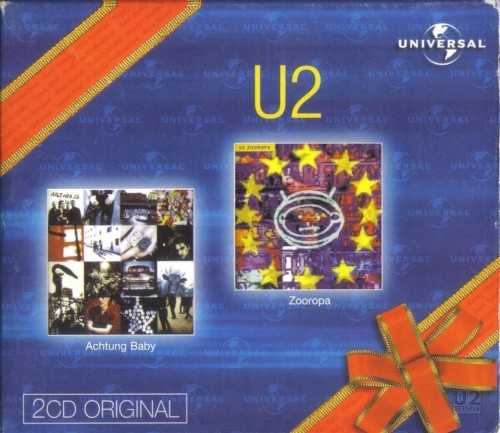 | Album: 11 of 22 Title: Achtung Baby / Zooropa Released: 1999-11-19 Tracks: 22 Duration: 1:46:46 Scroll: Up Down Top Bottom 25% 50% 75% AlbumCover | 1 Zoo Station (04:36) 2 Even Better Than the Real Thing (03:41) 3 One (04:36) 4 Until the End of the World (04:38) 5 Who’s Gonna Ride Your Wild Horses (05:16) 6 So Cruel (05:49) 7 The Fly (04:29) 8 Mysterious Ways (04:03) 9 Tryin’ to Throw Your Arms Around the World (03:52) 10 Ultra Violet (Light My Way) (05:30) 11 Acrobat (04:30) 12 Love Is Blindness (04:23) 1 Zooropa (06:31) 2 Babyface (04:01) 3 Numb (04:20) 4 Lemon (06:58) 5 Stay (Faraway, So Close!) (04:59) 6 Daddy’s Gonna Pay for Your Crashed Car (05:20) 7 Some Days Are Better Than Others (04:17) 8 The First Time (03:44) 9 Dirty Day (05:24) 10 The Wanderer / [untitled] (05:41) |
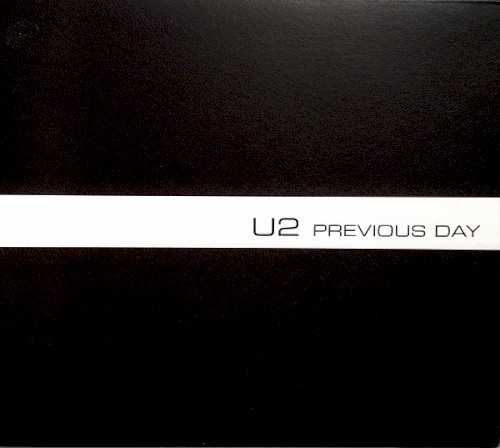 | Album: 12 of 22 Title: Previous Day Released: 2000-09 Tracks: 10 Duration: 41:44 Scroll: Up Down Top Bottom 25% 50% 75% AlbumCover | 1 I Will Follow (03:37) 2 Fire (03:50) 3 Sunday Bloody Sunday (04:40) 4 Pride (In the Name of Love) (03:49) 5 With or Without You (04:56) 6 Desire (02:59) 7 The Fly (04:29) 8 Stay (Faraway, So Close!) (04:59) 9 Discothèque (05:19) 10 Sweetest Thing (the single mix) (03:02) |
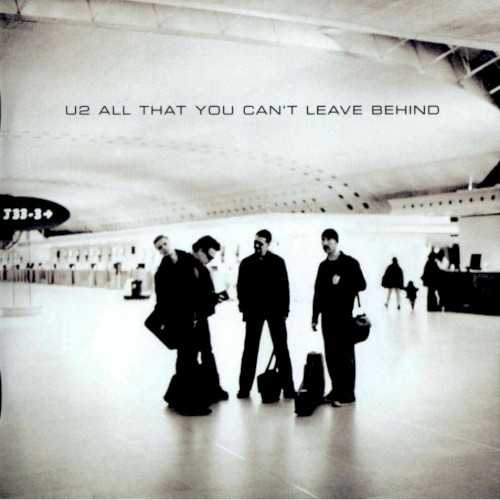 | Album: 13 of 22 Title: All That You Can’t Leave Behind Released: 2000-10-30 Tracks: 11 Duration: 49:24 Scroll: Up Down Top Bottom 25% 50% 75% Spotify Wikipedia Allmusic AlbumCover | 1 Beautiful Day (04:08) 2 Stuck in a Moment You Can’t Get Out Of (04:32) 3 Elevation (03:48) 4 Walk On (04:56) 5 Kite (04:26) 6 In a Little While (03:39) 7 Wild Honey (03:46) 8 Peace on Earth (04:48) 9 When I Look at the World (04:17) 10 New York (05:30) 11 Grace (05:30) |
| All That You Can’t Leave Behind : Allmusic album Review : Nearly ten years after beginning U2 Mach II with their brilliant seventh album Achtung Baby, U2 ease into their third phase with 2000s All That You Cant Leave Behind. The title signifies more than it seems, since the group sifts through its past, working with Daniel Lanois and Brian Eno, all in an effort to construct a classicist U2 album. Thankfully, its a rock record from a band that absorbed all the elastic experimentation, studio trickery, dance flirtations, and genre bending of Achtung, Zooropa, and Pop -- all theyve shed is the irony. U2 choose not to delve as darkly personal as they did on Achtung or Zooropa, yet they also avoid the alienating archness of Pop, returning to the generous spirit that flowed through their best 80s records. On that level, All may be reminiscent of The Joshua Tree, but this is a clever and craftsmanlike record, filled with nifty twists in the arrangements, small sonic details, and colors. U2 take subtle risks, such as their best pure pop song ever with "Wild Honey"; theyre so self-confident they effortlessly write their best anthem in years with "Beautiful Day"; they offer the gospel-influenced "Stuck in a Moment," never once lowering it to the shtick it would have been on Rattle and Hum. Like any work from craftsmen, All That You Cant Leave Behind winds up being a work of modest pleasures, where the way the verse eases into the chorus means more than the overall message, and this is truly the first U2 album where that sentiment applies -- but there is genuine pleasure in their craft, for the band and listener alike. | ||
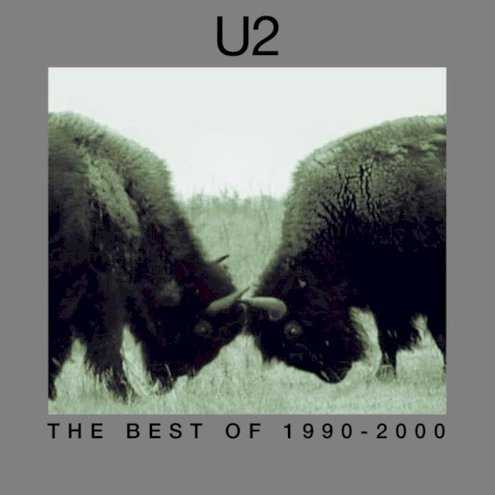 | Album: 14 of 22 Title: The Best of 1990–2000 Released: 2002-10-30 Tracks: 31 Duration: 2:30:29 Scroll: Up Down Top Bottom 25% 50% 75% Spotify Wikipedia Allmusic AlbumCover | 1 Even Better Than the Real Thing (03:41) 2 Mysterious Ways (04:03) 3 Beautiful Day (04:08) 4 Electrical Storm (William Orbit mix) (04:41) 5 One (04:36) 6 Miss Sarajevo (radio edit) (04:34) 7 Stay (Faraway, So Close!) (04:59) 8 Stuck in a Moment You Can’t Get Out Of (04:32) 9 Gone (new mix) (04:36) 10 Until the End of the World (04:38) 11 The Hands That Built America (04:58) 12 Discothèque (new mix) (04:44) 13 Hold Me, Thrill Me, Kiss Me, Kill Me (04:46) 14 Staring at the Sun (new mix) (04:51) 15 Numb (new mix) (04:25) 16 The First Time (03:50) 17 The Fly (04:29) 1 Lady With the Spinning Head (extended dance mix) (06:08) 2 Dirty Day (Junk Day mix) (04:42) 3 Summer Rain (04:08) 4 Electrical Storm (04:25) 5 North and South of the River (04:38) 6 Your Blue Room (05:29) 7 Happiness Is a Warm Gun (The Gun mix) (04:47) 8 Salomé (Zooromancer remix) (05:52) 9 Even Better Than the Real Thing (The Perfecto mix) (06:39) 10 Numb (Gimme Some More Dignity mix) (05:51) 11 Mysterious Ways (Solar Plexus club mix) (04:10) 12 If God Will Send His Angels (Big Yam mix) (05:42) 13 Lemon (Jeep mix) (05:30) 14 Discothèque (Hexidecimal mix) (05:44) |
| The Best of 1990–2000 : Allmusic album Review : The story goes like this: poised on the brink of disappearing in their own earnestness in the wake of the Rattle and Hum, U2 revitalized themselves with Achtung Baby, embracing irony and modern music in a garish celebration of pop culture that effectively distracted attention from the wounded, broken heart at its center. Basking in the acclaim of Achtung Baby, U2 continued to release Euro-experimental music -- equal parts Madchester, Krautrock, and good old-fashioned prog rock, partially courtesy of longtime collaborator Brian Eno -- until their ambition imploded on Pop, leading them to a celebrated return to roots, All That You Cant Leave Behind. Through it all, they turned out singles that equaled their 80s work (and in the case of "One" and "Beautiful Day," surpassed it), providing the basic ingredients for a great hits collection, but The Best of 1990-2000 is botched, nearly fatally so, by a desperate attempt to rewrite history. Original mixes are replaced by recent remixes, while album tracks (why does "The First Time" close the collection?) and two new songs elbow out actual hits. Naturally, this highlights whats missing, which is quite a bit: "The Fly," "Whos Gonna Ride Your Wild Horses," "Zooropa," "Lemon," "Mofo," "Last Night on Earth," "Walk On," "Elevation," "Peace on Earth," to name a few. This wouldnt hurt as much if the new songs were good, but theyre bland, particularly "Electrical Storm" (which, to add insult to injury, is presented not in the original mix, but in a William Orbit mix), an attempt to give the aesthetic of Behind a vague electronic gloss that doesnt work. Worst of all, anytime U2 flirted too closely with either dance or electronica has been replaced by mixes that attempt to give these tunes the sound of neo-classicist U2 à la All That You Cant Leave Behind. So, all the Pop material ("Gone," "Discotheque," "Staring at the Sun") is given new mixes, as is "Numb," none improvements and all undermining the actual career arc of U2 in the 90s. Then, these mixes, new songs, and hits are thrown out seemingly at random, with no regard for either chronology or musical momentum. Sure, there are great songs here -- not just "Mysterious Ways" and "Beautiful Day," but relatively rare items like the Passengers tune "Miss Sarajevo" (sounding more majestic than ever) and the Batman & Robin theme "Hold Me, Thrill Me, Kiss Me, Kill Me" (a glam rock pastiche that was the best thing about the film and remains a highlight), plus the underappreciated "Stay (Faraway, So Close!)" (as lovely as anything theyve ever cut). And that may be enough for some listeners, but its hard not to wish that The Best of 1990-2000 actually lived up to its title and presented an overview of this excellent era in a logical, accurate manner. | ||
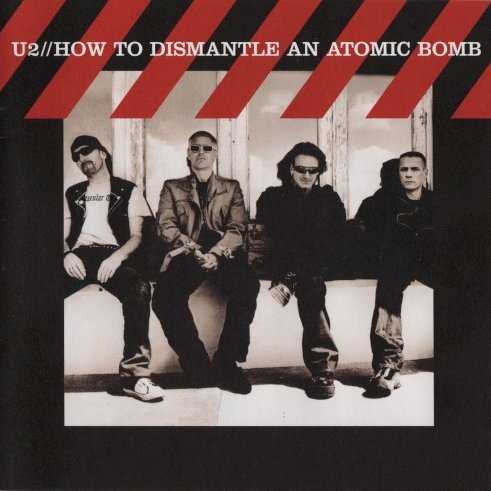 | Album: 15 of 22 Title: How to Dismantle an Atomic Bomb Released: 2004-11-17 Tracks: 11 Duration: 49:06 Scroll: Up Down Top Bottom 25% 50% 75% Spotify Allmusic AlbumCover | 1 Vertigo (03:13) 2 Miracle Drug (03:59) 3 Sometimes You Can’t Make It on Your Own (05:08) 4 Love and Peace or Else (04:50) 5 City of Blinding Lights (05:47) 6 All Because of You (03:39) 7 A Man and a Woman (04:30) 8 Crumbs From Your Table (05:03) 9 One Step Closer (03:51) 10 Original of the Species (04:41) 11 Yahweh (04:21) |
| How to Dismantle an Atomic Bomb : Allmusic album Review : Ever since the beginning of their career, U2 had a sense of purpose and played on a larger scale than their peers, so when they stumbled with the knowing rocktronica fusion of 1997s Pop -- the lone critical and commercial flop in their catalog -- it was enough to shake the perception held among fans and critics, perhaps even among the group itself, that the band was predestined to always be the worlds biggest and best rock & roll band. Following that brief, jarring stumble, U2 got back to where they once belonged with All That You Cant Leave Behind, returning to the big-hearted anthems of their 80s work. It was a confident, cinematic album that played to their strengths, winning back the allegiance of wary fans and critics, who were eager to once again bestow the title of the worlds biggest and best band upon the band, but all that praise didnt acknowledge a strange fact about the album: it was a conservative affair. After grandly taking risks for the better part of a decade, U2 curbed their sense of adventure, consciously stripping away the irony that marked every one of their albums since 1991s Achtung Baby, and returning to the big, earnest sound and sensibility of their classic 80s work. How to Dismantle an Atomic Bomb, the long-awaited 2004 sequel to ATYCLB, proves that this retreat was no mere fling: the band is committed to turning back the clock and acting like the 90s never happened. Essentially, U2 are trying to revirginize themselves, to erase their wild flirtation with dance clubs and postmodernism so they can return to the time they were the social conscience of rock music. Gone are the heavy dance beats, gone are the multiple synthesizers, gone are the dense soundscapes that marked their 90s albums, but U2 are so concerned with recreating their past that they dont know where to stop peeling away the layers. Theyve overcorrected for their perceived sins, scaling back their sound so far that they have shed the murky sense of mystery that gave The Unforgettable Fire and The Joshua Tree an otherworldly allure. That atmospheric cloud has been replaced with a clean, sharp production, gilded in guitars and anchored with straight-ahead, unhurried rhythms that never quite push the songs forward. This crisp production lacks the small sonic shadings that gave ATYCLB some depth, and leaves How to Dismantle an Atomic Bomb showcasing U2 at their simplest, playing direct, straight-ahead rock with little subtlety and shading in the production, performance, or lyrics. Sometimes, this works to the bands detriment, since it can reveal how familiar the Edges guitar has grown or how buffoonish Bonos affectations have become (worst offender: the overdubbed "hola!" that answers the "hello" in the chorus of "Vertigo"). But the stark production can also be an advantage, since the band still sounds large and powerful. U2 still are expert craftsmen, capable of creating records with huge melodic and sonic hooks, of which there are many on HTDAAB, including songs as reassuring as the slyly soulful "Sometimes You Cant Make It on Your Own" and the soaring "City of Blinding Lights," or the pile-driving "All Because of You." Make no mistake, these are all the ingredients that make How to Dismantle an Atomic Bomb a very good U2 record, but what keeps it from reaching the heights of greatness is that it feels too constrained and calculated, too concerned with finding purpose in the past instead of bravely heading into the future. Its a minor but important detail that may not matter to most listeners, since the record does sound good when its playing, but this conservatism is what keeps HTDAAB earthbound and prevents it from standing alongside War, The Joshua Tree, and Achtung Baby as one of the groups finest efforts. | ||
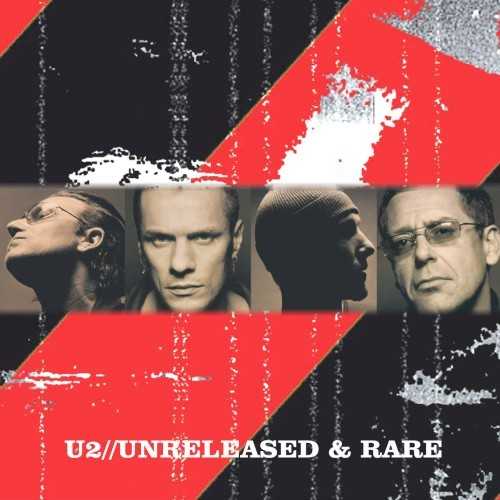 | Album: 16 of 22 Title: Unreleased & Rare Released: 2004-11-23 Tracks: 18 Duration: 1:17:39 Scroll: Up Down Top Bottom 25% 50% 75% AlbumCover | 1 Levitate (From All That You Cant Leave Behind Sessions) (05:10) 2 Love You Like Mad (From All That You Cant Leave Behind Sessions) (04:19) 3 Smile (From How to Dismantle an Atomic Bomb Sessions) (03:18) 4 Flower Child (From All That You Cant Leave Behind Sessions) (04:56) 5 Beautiful Ghost - Introduction to Songs of Experience (From the Joshua Tree Sessions) (03:54) 6 Jesus Christ (From the Sun Studio Sessions for Rattle & Hum) (03:14) 7 Xanax and Wine (From How to Dismantle an Atomic Bomb Sessions) (04:40) 8 All Because of You (alternate version) (03:37) 9 Native Son (03:10) 10 Yahweh (alternate version) (04:33) 11 Sometimes You Cant Make It on Your Own (alternate version) (05:31) 12 Numb (radio edit) (03:59) 13 Bass Trap (Edited version) (03:34) 14 Night and Day (Twilight remix) (05:32) 15 Numb (Gimme Some More Dignity mix edit) (05:52) 16 Salome (Zooromancer remix edit) (05:53) 17 Christmas (Baby Please Come Home) (02:22) 18 Stateless (Soundtrack version) (04:05) |
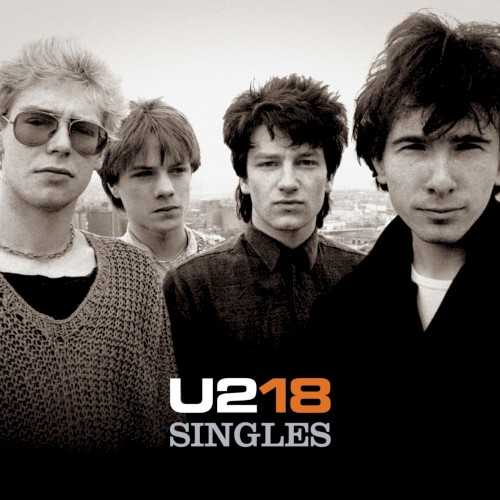 | Album: 17 of 22 Title: U218 Singles Released: 2006-06-11 Tracks: 18 Duration: 1:14:41 Scroll: Up Down Top Bottom 25% 50% 75% Spotify Wikipedia Allmusic AlbumCover | 1 Beautiful Day (04:08) 2 I Still Haven’t Found What I’m Looking For (04:38) 3 Pride (In the Name of Love) (03:49) 4 With or Without You (04:56) 5 Vertigo (03:13) 6 New Year’s Day (04:18) 7 Mysterious Ways (04:03) 8 Stuck in a Moment You Can’t Get Out Of (04:32) 9 Where the Streets Have No Name (04:47) 10 Sweetest Thing (03:01) 11 Sunday Bloody Sunday (04:40) 12 One (04:36) 13 Desire (02:59) 14 Walk On (04:29) 15 Elevation (03:48) 16 Sometimes You Can’t Make It on Your Own (05:08) 17 The Saints Are Coming (03:22) 18 Window in the Skies (04:07) |
| U218 Singles : Allmusic album Review : U2s first two greatest-hits albums neatly divided themselves by decade, with the first covering the 80s and the second summing up the 90s. Their third hits comp, 2006s U218 Singles, is at once more ambitious and more concise, offering an overview of their first 26 years on a single disc comprised of 18 tracks -- and since two of those are new songs, that leaves just 16 songs to tell their whole story. Thats not much space for a band with a career as lengthy and ambitious as U2, so its inevitable that some painful cuts have been made. Nothing from October, Zooropa or Pop is here, and unless youre buying various import editions that have "I Will Follow" as a bonus track, theres nothing from Boy, either. Theres only one cut each from The Unforgettable Fire and Rattle and Hum -- and bucking conventional wisdom, none of their three widely accepted masterpieces -- War, The Joshua Tree, or Achtung Baby -- provide the most songs here. No, out of all their albums the one that dominates U218 Singles is All That You Cant Leave Behind, their 2000 comeback from the depths of the misguided Pop, and one of two records that theyve released since their last hits compilation, The Best of 1990-2000. The other record theyve released since then is How to Dismantle an Atomic Bomb, which provides two songs here -- or, as many as there are from War and Achtung Baby. What this means is that this compilation skews very heavily toward latter-day U2 -- eight out of 18 tracks, a full 44 percent of the collection, are from 2000 on, which means that U218 Singles presents the classicist version of the band, featuring the anthems from U2 at their peak, plus the highlights from when U2 were trying their best to sound like U2 at their peak. They did it quite well, of course, from both a commercial and artistic standpoint, sometimes writing songs that stood proudly alongside "Pride (In the Name of Love)" and "Sunday Bloody Sunday" (as in "Beautiful Day") and sometimes not ("Elevation"). When its all mixed together, it paints a portrait of a band thats a little slicker and streamlined than it often was, and its hard not to miss the big-hearted yet moody band that made "Bad," "Gloria," and "A Sort of Homecoming," not to mention the middle-aged Euro experimentalists responsible for "Numb" and "Stay! (Faraway, So Close)," two essential components of the band that has been forced aside by the arena rock pros on display here. Then again, U2 always were the best arena rockers of their generation, and for those who love the spectacle and sound of the band in full flight, U218 Singles serves up that side of the band quite well, along with two new entries that find the band continuing the assured, even-handed sound of Atomic Bomb: a cover of the Skids "The Saints Are Coming," recorded with Green Day and rewritten to vaguely address the aftermath of Hurricane Katrina, and "Window in the Skies," an anthemic pop number that relies too heavily on synth strings yet is saved by the bands sturdy songwriting and reliable performance. As such, it might not cover all the bases, but it covers enough of the major ones to be a good summary for fellow travelers who just know U2 from the radio, and its also a good one-stop introduction to the basics for neophytes. | ||
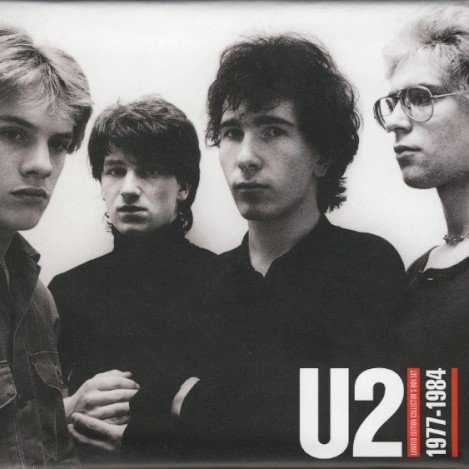 | Album: 18 of 22 Title: 1977–1984: Collector’s Box Set Released: 2008-07-29 Tracks: 75 Duration: 4:56:58 Scroll: Up Down Top Bottom 25% 50% 75% Allmusic AlbumCover | 1 I Will Follow (03:37) 2 Twilight (04:22) 3 An Cat Dubh (04:46) 4 Into the Heart (03:27) 5 Out of Control (04:14) 6 Stories for Boys (03:02) 7 The Ocean (01:35) 8 A Day Without Me (03:13) 9 Another Time, Another Place (04:33) 10 The Electric Co. (04:47) 11 Shadows and Tall Trees (04:36) 1 I Will Follow (previously unreleased mix) (03:37) 2 11 O’Clock Tick Tock (single version) (03:45) 3 Touch (single version) (03:25) 4 Speed of Life (03:18) 5 Saturday Night (05:12) 6 Things to Make and Do (02:16) 7 Out of Control (single version) (03:52) 8 Boy‐Girl (single version) (03:23) 9 Stories for Boys (single version) (02:42) 10 Another Day (single version) (03:28) 11 Twilight (single version) (04:35) 12 Boy‐Girl (03:26) 13 11 O’Clock Tick Tock (04:58) 14 Cartoon World (04:20) 1 Gloria (04:12) 2 I Fall Down (03:39) 3 I Threw a Brick Through a Window (04:54) 4 Rejoice (03:38) 5 Fire (03:50) 6 Tomorrow (04:39) 7 October (02:20) 8 With a Shout (04:02) 9 Stranger in a Strange Land (03:57) 10 Scarlet (02:52) 11 Is That All? (02:59) 1 Gloria (live) (04:43) 2 I Fall Down (live) (03:01) 3 I Threw a Brick Through a Window (live) (03:52) 4 Fire (live) (03:31) 5 October (live) (02:22) 6 With a Shout (BBC session) (03:33) 7 Scarlet (BBC session) (02:45) 8 I Threw a Brick Through a Window (BBC session) (04:17) 9 A Celebration (02:57) 10 J. Swallo (02:20) 11 Trash, Trampoline and the Party Girl (02:35) 12 I Will Follow (live) (03:44) 13 The Ocean (live) (02:15) 14 The Cry / Electric Co. (live) (04:27) 15 11 OClock Tick Tock (live) (04:57) 16 I Will Follow (live) (03:52) 17 Tomorrow (Common Ground remix) (04:35) 1 Sunday Bloody Sunday (04:40) 2 Seconds (03:10) 3 New Year’s Day (05:35) 4 Like a Song… (04:46) 5 Drowning Man (04:14) 6 The Refugee (03:40) 7 Two Hearts Beat as One (04:03) 8 Red Light (03:46) 9 Surrender (05:34) 10 “40” (02:35) 1 Endless Deep (02:58) 2 Angels Too Tied to the Ground (03:34) 3 New Year’s Day (7″ single edit) (03:53) 4 New Year’s Day (US remix) (04:28) 5 New Year’s Day (Ferry Corsten extended vocal mix) (09:41) 6 New Year’s Day (Ferry Corsten vocal radio mix) (04:36) 7 Two Hearts Beat as One (long mix) (05:55) 8 Two Hearts Beat as One (US remix) (04:21) 9 Two Hearts Beat as One (club version) (05:41) 10 Treasure (Whatever Happened to Pete the Chop?) (03:24) 11 I Threw a Brick Through a Window / A Day Without Me (06:57) 12 Fire (03:45) |
| 1977–1984: Collector’s Box Set : Allmusic album Review : This limited-edition collectors box set includes the bands first three long-players, Boy, October, and War, all of which are the 2008 deluxe reissues and feature the complete studio albums paired with a bonus disc of B-sides, live tracks, and rarities, as well as a detailed multi-page booklet. | ||
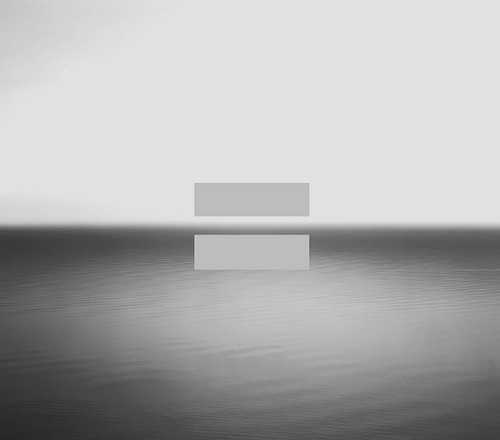 | Album: 19 of 22 Title: No Line on the Horizon Released: 2009-02-25 Tracks: 11 Duration: 53:46 Scroll: Up Down Top Bottom 25% 50% 75% Spotify TrackSamples Wikipedia Allmusic AlbumCover | 1 No Line on the Horizon (04:12) 2 Magnificent (05:24) 3 Moment of Surrender (07:24) 4 Unknown Caller (06:02) 5 I’ll Go Crazy If I Don’t Go Crazy Tonight (04:13) 6 Get On Your Boots (03:25) 7 Stand Up Comedy (03:49) 8 Fez – Being Born (05:16) 9 White as Snow (04:41) 10 Breathe (05:00) 11 Cedars of Lebanon (04:16) |
| No Line on the Horizon : Allmusic album Review : A rock & roll open secret: U2 care very much about what other people say about them. Ever since they hit the big time in 1987 with The Joshua Tree, every album is a response to the last -- rather, a response to the response, a way to correct the mistakes of the last album: Achtung Baby erased the roots rock experiment Rattle and Hum, All That You Cant Leave Behind straightened out the fumbling Pop, and 2009s No Line on the Horizon is a riposte to the suggestion they played it too safe on 2004s How to Dismantle an Atomic Bomb. After recording two new cuts with Rick Rubin for the 06 compilation U218 and flirting with will.i.am, U2 reunited with Brian Eno and Daniel Lanois (here billed as "Danny" for some reason), who not only produced The Joshua Tree but pointed the group toward aural architecture on The Unforgettable Fire. Much like All That You Cant and Atomic Bomb, which were largely recorded with their first producer, Steve Lillywhite, this is a return to the familiar for U2, but where their Lillywhite LPs are characterized by muscle, the Eno/Lanois records are where the band take risks, and so it is here that U2 attempts to recapture that spacy, mysterious atmosphere of The Unforgettable Fire and then take it further. Contrary to the suggestion of the clanking, sputtering first single "Get on Your Boots" -- its riffs and "Pump It Up" chant sounding like a cheap mashup stitched together in GarageBand -- this isnt a garish, gaudy electro-dalliance in the vein of Pop. Apart from a stilted middle section -- "Boots," the hamfisted white-boy funk "Stand Up Comedy," and the not-nearly-as-bad-as-its-title anthem "Ill Go Crazy if I Dont Go Crazy Tonight"; tellingly, the only three songs here to not bear co-writing credits from Eno and Lanois -- No Line on the Horizon is all austere grey tones and midtempo meditation. Its a record that yearns to be intimate but U2 dont do intimate, they only do majestic, or as Bono sings on one of the albums best tracks, they do "Magnificent." Here, as on "No Line on the Horizon" and "Breathe," U2 strike that unmistakable blend of soaring, widescreen sonics and unflinching openhearted emotion thats been their trademark, turning the intimate into something hauntingly universal. These songs resonate deeper and longer than anything on Atomic Bomb, their grandeur almost seeming effortless. Its the rest of the record that illustrates how difficult it is to sound so magnificent. With the exception of that strained middle triptych, the rest of the album is in the vein of "No Line on the Horizon", "Magnificent" and "Breathe," only quieter and unfocused, with its ideas drifting instead of gelling. Too often, the album whispers in a murmur so quiet its quite easy to ignore -- "White as Snow," an adaptation of a traditional folk tune, and "Cedars of Lebanon," its verses not much more than a recitation, simmer so slowly they seem to evaporate -- but at least these poorly defined subtleties sustain the hazily melancholy mood of No Line on the Horizon. When U2, Eno, and Lanois push too hard -- the ill-begotten techno-speak overload of "Unknown Caller," the sound sculpture of "Fez-Being Born" -- the ideas collapse like a pyramid of cards, the confusion amplifying the aimless stretches of the album, turning it into a murky muddle. Upon first listen, No Line on the Horizon seems as if it would be a classic grower, an album that makes sense with repeated spins, but that repetition only makes the album more elusive, revealing not that U2 went into the studio with a dense, complicated blueprint, but rather, they had no plan at all. | ||
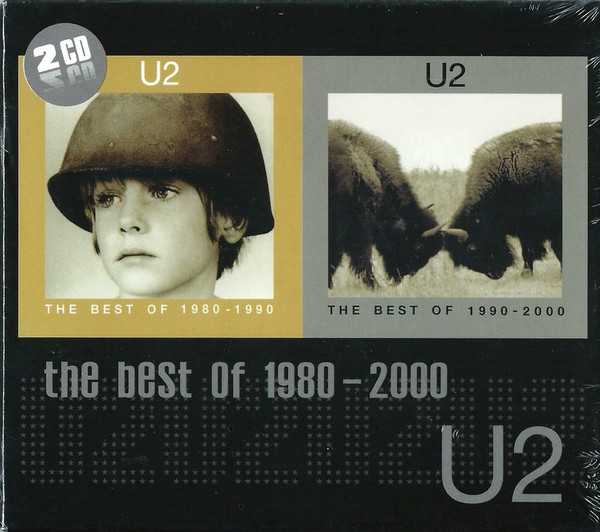 | Album: 20 of 22 Title: The Best of 1980–2000 Released: 2009-11-27 Tracks: 30 Duration: 2:17:27 Scroll: Up Down Top Bottom 25% 50% 75% Allmusic AlbumCover | 1 Pride (In the Name of Love) (03:49) 2 New Year’s Day (04:18) 3 With or Without You (04:56) 4 I Still Haven’t Found What I’m Looking For (04:38) 5 Sunday Bloody Sunday (04:40) 6 Bad (05:51) 7 Where the Streets Have No Name (04:36) 8 I Will Follow (03:37) 9 The Unforgettable Fire (04:55) 10 Sweetest Thing (the single mix) (03:02) 11 Desire (02:59) 12 When Love Comes to Town (04:16) 13 Angel of Harlem (03:49) 14 All I Want Is You / October (09:51) 1 Even Better Than the Real Thing (03:41) 2 Mysterious Ways (04:03) 3 Beautiful Day (04:08) 4 Electrical Storm (William Orbit mix) (04:41) 5 One (04:36) 6 Miss Sarajevo (radio edit) (04:34) 7 Stay (Faraway, So Close!) (04:59) 8 Stuck in a Moment You Can’t Get Out Of (04:32) 9 Gone (new mix) (04:36) 10 Until the End of the World (04:38) 11 The Hands That Built America (05:00) 12 Discothèque (new mix) (04:44) 13 Hold Me, Thrill Me, Kiss Me, Kill Me (04:46) 14 Staring at the Sun (new mix) (04:51) 15 Numb (new mix) (04:25) 16 The First Time (03:44) |
| The Best of 1980–2000 : Allmusic album Review : This two-fer from Island Records rounds up both of the labels popular career-overview U2 compilations. 1998s Best of 1980-1990 offers up the most ammunition, with radio hits like "Where the Streets Have No Name," "New Years Day," "With or Without You," "Pride (In the Name of Love)", and "Desire," while 2002s Best of 1990-2000 focuses on the bands more experimental, Brian Eno-heavy period, with highlights arriving via songs like "Mysterious Ways," "Beautiful Day," and "One." | ||
![Allmusic album Review : Many U2 albums experience a difficult birth, but their 13th studio record underwent a particularly extended labor. Gestating for years, possibly started immediately after 2009s No Line on the Horizon and ushered into existence by many midwives, Songs of Innocence appeared suddenly in September 2014, nearly nine months after "Invisible," the presumptive lead single for the record, flopped. "Invisible" is nowhere to be found on Songs of Innocence, yet its vaguely electronic thrum did indeed turn out to be a taste of where U2 were headed after those endless sessions wound up shepherded by Danger Mouse. Songs of Innocence -- its title taken from William Blake, although many music nerds may first think of David Axelrod -- does indeed incorporate electronic elements in a way no U2 album since Pop has, weaving samples, loops, and other flourishes within music that otherwise adheres to the self-conscious classicism that has been the bands stock in trade since Y2K. Which is another way of saying that where the U2 of the 90s looked forward, the 2014 U2 are looking back, aware of a legacy that includes decades of arena-filling anthems, the deliberate reinvention of Achtung Baby, and their initial inspiration from the great spark of punk rock. The latter also provides the thematic fuel on Songs of Innocence, a quasi-autobiographical coming-of-age story from Bono that begins with the big bang of "The Miracle (Of Joey Ramone)." This opening fanfare doesnt sound a thing like the Ramones, nor does "This Is Where You Can Reach Me Now" sound like its reported inspiration, the Clash: they, like everything else here, sound like U2, albeit a U2 who are beginning to carry the weight of their years somewhat uneasily. Majesty doesnt come easily to them anymore, so theyve replaced surging melodrama with a brittle, insistent clamor thats intended to dazzle. Its busy enough to be bracing yet its also wearying, exuding a faint air of desperation that dampens the emotional pull of such lovely moments as "Song for Someone" and "The Troubles" (the latter featuring vocals from Lykke Li) while merely providing clatter elsewhere. Often, theres a nagging sense U2 couldve pushed themselves a little harder sonically -- "Raised by Wolves" benefits from the coiled paranoia created by its frenetically circling vocals and guitars -- but that wouldve required risk, which theyve been avoiding since Pops garbled rollout. Instead, Songs of Innocence showcases how U2 desire to have things both ways. They camouflage their nostalgia in the sound of modernity; they play gigantic music about intimacy; they want to expand their horizons without leaving home. They want to be everything to everyone and, in attempting to do so, theyve wound up with a record that appeals to a narrow audience: fellow travelers who either thrill at the spectacle or dig for the subtleties buried underneath the digital din. [Upon the surprise digital release of Songs of Innocence in September 2014, U2 announced the physical edition would appear a month later with an extra disc of bonus tracks. The band kept their promise, adding a second disc (along with finished artwork) to their thirteenth studio album for its physical release. Depending how you keep score, this second disc contains either 5, 10, or 11 tracks; the count is thrown off by five cuts being sequenced as one 22-minute track called "Acoustic Sessions" and a slightly alternate version of "Invisible" being buried as a hidden track at the end. Along with these "Acoustic Sessions" -- most being more fully arranged than the title suggests, particularly "Raised by Wolves" -- there is an alternate version of "The Troubles" and an "alternate perspective mix by Tchad Blake" for "Sleep Like a Baby Tonight," welcome variations all but which basically leave two songs as enticements for anybody other than the hardcore: "Lucifers Hands" and "The Crystal Ballroom." Neither song seems to belong thematically to the loose semi-autobiographical narrative of the proper album and theyre also more nimble than much of the record, with "Lucifers Hands" benefitting from a dense percolating arrangement anchored by a trashy little guitar riff and "The Crystal Ballroom" evoking an arch, art-punk disco quite well. They might not have fit snugly onto the record but as individual songs, theyre stronger than some of the tunes that made the cut.] songs_of_innocence](../../images/u2-songs_of_innocence.jpg) | Album: 21 of 22 Title: Songs of Innocence Released: 2014-09-09 Tracks: 12 Duration: 55:38 Scroll: Up Down Top Bottom 25% 50% 75% Spotify Wikipedia Allmusic AlbumCover | 1 The Miracle (of Joey Ramone) (04:15) 2 Every Breaking Wave (04:12) 3 California (There Is No End to Love) (04:00) 4 Song for Someone (03:47) 5 Iris (Hold Me Close) (05:19) 6 Volcano (03:14) 7 Raised by Wolves (04:06) 8 Cedarwood Road (04:25) 1 Sleep Like a Baby Tonight (05:02) 2 This Is Where You Can Reach Me Now (05:05) 3 The Troubles (04:46) 4 The Crystal Ballroom (12" mix) (07:27) |
| Songs of Innocence : Allmusic album Review : Many U2 albums experience a difficult birth, but their 13th studio record underwent a particularly extended labor. Gestating for years, possibly started immediately after 2009s No Line on the Horizon and ushered into existence by many midwives, Songs of Innocence appeared suddenly in September 2014, nearly nine months after "Invisible," the presumptive lead single for the record, flopped. "Invisible" is nowhere to be found on Songs of Innocence, yet its vaguely electronic thrum did indeed turn out to be a taste of where U2 were headed after those endless sessions wound up shepherded by Danger Mouse. Songs of Innocence -- its title taken from William Blake, although many music nerds may first think of David Axelrod -- does indeed incorporate electronic elements in a way no U2 album since Pop has, weaving samples, loops, and other flourishes within music that otherwise adheres to the self-conscious classicism that has been the bands stock in trade since Y2K. Which is another way of saying that where the U2 of the 90s looked forward, the 2014 U2 are looking back, aware of a legacy that includes decades of arena-filling anthems, the deliberate reinvention of Achtung Baby, and their initial inspiration from the great spark of punk rock. The latter also provides the thematic fuel on Songs of Innocence, a quasi-autobiographical coming-of-age story from Bono that begins with the big bang of "The Miracle (Of Joey Ramone)." This opening fanfare doesnt sound a thing like the Ramones, nor does "This Is Where You Can Reach Me Now" sound like its reported inspiration, the Clash: they, like everything else here, sound like U2, albeit a U2 who are beginning to carry the weight of their years somewhat uneasily. Majesty doesnt come easily to them anymore, so theyve replaced surging melodrama with a brittle, insistent clamor thats intended to dazzle. Its busy enough to be bracing yet its also wearying, exuding a faint air of desperation that dampens the emotional pull of such lovely moments as "Song for Someone" and "The Troubles" (the latter featuring vocals from Lykke Li) while merely providing clatter elsewhere. Often, theres a nagging sense U2 couldve pushed themselves a little harder sonically -- "Raised by Wolves" benefits from the coiled paranoia created by its frenetically circling vocals and guitars -- but that wouldve required risk, which theyve been avoiding since Pops garbled rollout. Instead, Songs of Innocence showcases how U2 desire to have things both ways. They camouflage their nostalgia in the sound of modernity; they play gigantic music about intimacy; they want to expand their horizons without leaving home. They want to be everything to everyone and, in attempting to do so, theyve wound up with a record that appeals to a narrow audience: fellow travelers who either thrill at the spectacle or dig for the subtleties buried underneath the digital din. [Upon the surprise digital release of Songs of Innocence in September 2014, U2 announced the physical edition would appear a month later with an extra disc of bonus tracks. The band kept their promise, adding a second disc (along with finished artwork) to their thirteenth studio album for its physical release. Depending how you keep score, this second disc contains either 5, 10, or 11 tracks; the count is thrown off by five cuts being sequenced as one 22-minute track called "Acoustic Sessions" and a slightly alternate version of "Invisible" being buried as a hidden track at the end. Along with these "Acoustic Sessions" -- most being more fully arranged than the title suggests, particularly "Raised by Wolves" -- there is an alternate version of "The Troubles" and an "alternate perspective mix by Tchad Blake" for "Sleep Like a Baby Tonight," welcome variations all but which basically leave two songs as enticements for anybody other than the hardcore: "Lucifers Hands" and "The Crystal Ballroom." Neither song seems to belong thematically to the loose semi-autobiographical narrative of the proper album and theyre also more nimble than much of the record, with "Lucifers Hands" benefitting from a dense percolating arrangement anchored by a trashy little guitar riff and "The Crystal Ballroom" evoking an arch, art-punk disco quite well. They might not have fit snugly onto the record but as individual songs, theyre stronger than some of the tunes that made the cut.] | ||
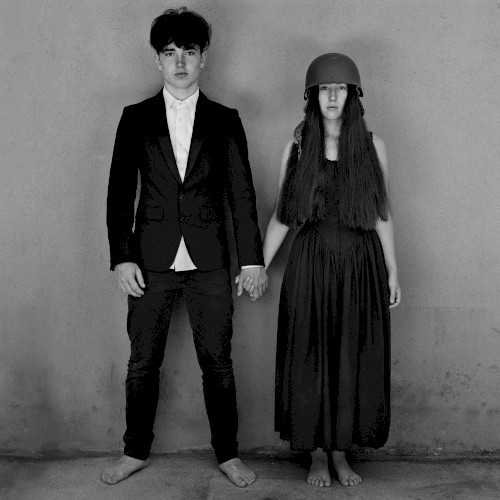 | Album: 22 of 22 Title: Songs of Experience Released: 2017-12-01 Tracks: 18 Duration: 1:15:04 Scroll: Up Down Top Bottom 25% 50% 75% Spotify Allmusic AlbumCover | 1 Love Is All We Have Left (02:41) 2 Lights of Home (04:16) 3 You’re the Best Thing About Me (03:45) 4 Get Out of Your Own Way (03:58) 5 American Soul (04:21) 6 Summer of Love (03:24) 7 Red Flag Day (03:19) 8 The Showman (Little More Better) (03:23) 9 The Little Things That Give You Away (04:55) 10 Landlady (04:01) 11 The Blackout (04:45) 12 Love Is Bigger Than Anything in Its Way (04:00) 13 13 (There Is a Light) (04:19) 14 Ordinary Love (Extraordinary mix) (03:47) 15 Book of Your Heart (03:55) 16 Lights of Home (St Peter’s string version) (04:33) 17 You’re the Best Thing About Me (04:16) 18 The Blackout (Jacknife Lee remix) (07:18) |
| Songs of Experience : Allmusic album Review : "I shouldnt be here because I should be dead" sings Bono on "Lights of Home," the second track on Songs of Experience, the long-delayed sequel to 2014s Songs of Innocence. Its not merely a turn of phrase. Two months after U2 unleashed Songs of Innocence on the world, Bono injured himself in a bicycle accident so severe he suspected he may never play guitar again. He recovered, but his misfortune derailed plans for the band to wrap up Songs of Experience swiftly, so U2 decided to take their time. A version of the record neared completion in 2016, but that years twin elections of Brexit and Trump spurred U2 to revise the album, as they decided they couldnt release a record that didnt address such cataclysmic political events. Retro-conning the existing Songs of Experience material to suit the political climate wasnt the easiest task and the album often shows its seams, particularly when Bono decides to tackle the crisis head-on: the line "Democracy is flat on its back, Jack" arrives with a thud on "The Blackout," but its nothing compared to "American Soul," an ode to real America where the singer and the band engage in a battle of hams. "American Soul" also features a line -- and no more -- by Kendrick Lamar, the rapper who is on the vanguard of popular music in 2017 (no less of an authority than David Bowie cited Lamar as an influence on his final album, Blackstar), but Kendrick gets buried in the mix in a fashion thats sadly indicative of the tentative nature of Songs of Experience. Bono may wrestle with big themes in his lyrics but his ambitions are reined in by a production that seems afraid of alienating any constituent. Typical to many modern records, Songs of Experience is the result of too many cooks: Jacknife Lee and Ryan Tedder claim the main production credits, with Andy Barlow, Jolyon Thomas, and old friend Steve Lillywhite responsible for additional production, whatever that may be. With all these hands, its not much of a surprise that Songs of Experience feels diffuse, its modernist moments -- like Bono embracing pitch-shifted vocals -- counterbalancing feints toward U2s arena rock past. It all feels so familiar, it takes a moment to realize that the echoes of the Edge are muted, that the rhythms are sometimes constrained by tight sequencing, that the glossy surface can sometimes recall Ellie Goulding, or how when the tempo slows, it feels like U2s greatest aspiration is to be as graceful as Coldplay. All this adds up to an album that feels vaguely desperate. Say what you will about the muddled Pop: at least it had an ethos. Here, U2 feel trapped between their history and the pull of the year, and they wind up seeming diminished. For the first time, they seem smaller than life. | ||